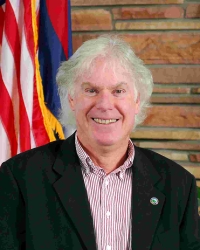This is the eighth in a series of candidate profiles written by students in Instructor Jeff Browne’s CU News Corps course at CU-Boulder. Lars Gesing is a graduate student from Hamburg, Germany, where he worked for several print and online publications, including the daily regional newspaper Hamburger Abendblatt.
Matt Appelbaum has a lot to say. It’s no surprise: thirty-two years of at least some kind of civic engagement will rack up a whole lot of experience, memories and anecdotes.
This fall, the current mayor of the City of Boulder is seeking yet another term on City Council—after a combined 14 years on the body. The first time Appelbaum took a seat on the council was in 1987. He kept it for eight years before leaving and then returned to the council in 2007.
He puts in well over 60 hours a week as mayor. Doesn’t he get tired of endless council meetings, discussions, and presentations?
“I thought about not running again,” Appelbaum admits. “But even though there is a lot of brain damage and a serious amount of work involved, there are still a lot of things going on that I find very fascinating.”
While he can always rely on his manifold experience, seeing the broader picture during a particular discussion also helps, he says.
One particular reason for Appelbaum to run again is to remain a key player in the ongoing municipalization debate. “We don’t necessarily have to end up with our own utility. But we have to engage in some real discussions about the benefits we could get out of it,” he says.
The mayor is anxious about how voters will decide on the ballot issue during this fall’s election. “All of the work could come to a dead end in a couple of weeks,” he fears, adding that the city “won’t get another shot at it for a very long time.”
He shares his anxiety with other city protagonists like Leslie Glustrom, co-founder of the non-profit group Clean Energy Action. “We only have an opportunity to review the Xcel franchise once in 20 years. So when that opportunity arises, it requires extended and focused effort. Like climbing Mount Everest or any tall mountain—it isn’t something you undertake lightly. It takes years of planning and execution,” she says.
A regional master plan to solve the transportation puzzle
Though Appelbaum personally, and many others on council and various city boards, already sank tremendous amounts of blood, sweat and tears into the municipal utility project, it’s not the only topic that triggers his lust for yet another stint.
“I have spent massive amounts of time over the last couple of years working on the U.S. Highway 36 coalition,” he points out. Trying to come up with a regional master plan for the puzzling problem of commuting has been—and still is—a constant motivator for Appelbaum.
Bus Rapid Transit. Those three words, “if done right,” might be the city’s best shot at taking care of the tens of thousands of people who come into Boulder to work and leave Boulder to get back to their lives every day, Appelbaum believes.
Ray Bridge, co-chair of PLAN-Boulder County, urges the city to acknowledge that “we have many in-commuters because we are part of a large metropolitan job market,” an opinion coherent with the mayor’s line of arguments.
However, trying to unravel the commute problem by charging parking fees would be a “big mistake,” Appelbaum says. While his fellow City Council candidate Sam Weaver and former council member Steve Pomerance are among those who support parking fees, he draws a daunting picture of what would happen: “Companies would just leave. Anybody who thinks people would pay for parking without real alternatives is exceptionally naïve.” Providing a city-wide EcoPass in return wouldn’t solve the problem either because of vastly differing transit access throughout the city, he argues.
Walking on hands faster than public transit
“If you live somewhere in the east corridor, you can probably get to work faster by walking on your hands than by using public transit,” Appelbaum says. He and his wife own a home in the Keewaydin neighborhood. He relates the at-times troubling state of the transit system to the lack of higher density in large parts of the city.
The mayor is quick to assure that he doesn’t support making Boulder a dense urban place. Instead, he comes up with the model of small urbanism, which he defines as “enough density to support transit and other benefits but not to experience significant changes to the community character.”
Appelbaum, a longtime computer software architect, is well aware of how large parts of the city were designed on a scratchboard more than 40 years ago. “If we can figure out ways to reimagine some of the 1970 office parks, we could make a really big difference,” he says.
“We advocate quick action on land use practices that facilitate the development of sustainable neighborhoods,” Boulder Chamber of Commerce President and CEO John Tayer agrees.
Being a Brooklyn native, Appelbaum has seen how urbanism and gentrification can drastically change the face of the built environment. But while the neighborhoods he roamed as a child have been completely reinvented over the course of a few decades, he doesn’t want the same for Boulder. “We need some evolutionary, not revolutionary changes,” he says.
So after all these years, Matt Appelbaum hasn’t yet had enough of Boulder’s politics?
“My wife Joni really likes to get me out of the house every once in a while. I get very lazy when I have nothing to do,” Appelbaum says, chuckling.
He really doesn’t have a choice, then.



